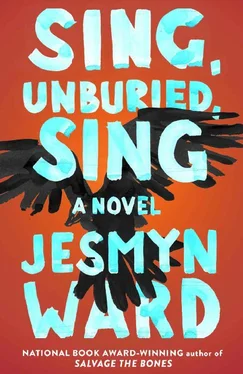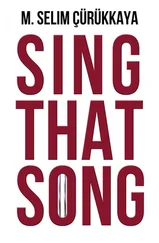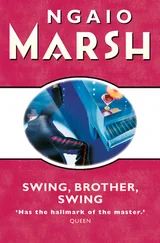But it was impossible to not hear the animals, because I looked at them and understood, instantly, and it was like looking at a sentence and understanding the words, all of it coming to me at once. So after Leonie left, I sat in the backyard for a while and listened to the pigs and the horses and old Stag’s singing sinking to silence like a whipping and dropping wind. I moved from pen to pen, watching the sun and estimating how long Leonie’d been gone, how long Mam and Pop were gone, how soon I could expect them to come back so I could go back inside the house. I was walking with my head tilted up, listening for the growl of tires, so I didn’t see the jagged lid of the can rising from the earth, didn’t see it when I put my foot on it, stepped down in the instinct of walking. It sank deep. I screamed and dropped, holding my leg, and I knew the animals understood me then, too: Let me go, great tooth! Spare me!
Instead, it burned and bled, and I sat on the ground in the horse’s clearing and cried and tasted ketchup and acid at the back of my throat and grabbed my ankle. I was too scared to pull the lid out then I heard a car door slam shut and nothing else until Pop’s voice called and I answered and he found me sitting on the ground, sniffing with my breath hitching and not caring my face was wet. Pop came to my side and touched me on the leg like he does our horse when he’s checking the shoe. In a quick second, he pulled it out, and I hollered. It was the first time I thought Pop didn’t do something good.
When Leonie came home that night, she didn’t say nothing. I don’t think she noticed my foot until Pop shouted at her, over and over again, Goddamnit, Leonie! I drowsed with pain medicine, itchy with antibiotics, my foot all wrapped in white, bound tight, and watched Pop slap the wall to punctuate: Leonie! She flinched, stepped away from him, and then said in a small voice: You was shucking oysters down at the docks when you was his age, Mam changing diapers. And then: He old enough. She said: You all right, huh, Jojo? And I looked at her and said: No, Leonie . It was a new thing, to look at her rubbing hands and her crooked teeth in her chattering mouth and not hear Mama in my head, but her name: Leonie . When I said it, she laughed, the sound erupting from her insides like a hard shovel cleaved it from her. Pop looked like he wanted to slap her face, but then he changed, and he snorted like he does when his crop don’t take or when one of his sows bears a half-dead litter: disappointed. He sat with me on one of the two sofas in the living room. That was the first night he let Mam sleep in the bed by herself. I slept on the love seat, and he slept on the sofa, where, after Mam got sicker and sicker, he stayed.
* * *
The goat smells like beef when it boils. It even looks like it too, dark and stringy in the pot. Pop pokes it with a spoon, testing the tenderness, and cocks the lid crooked so that steam billows in the air.
“Pop, you going to tell me about you and Stag again?” I ask.
“About what?” Pop asks.
“Parchman,” I say. Pop folds his arms. Leans over to smell the goat.
“Ain’t I told it to you before?” he asks.
I shrug. Sometimes I think I look like Stag around my nose and mouth. Stag and Pop. I want to hear about the ways they are different. The ways we are all different. “Yeah, but I want to hear it anyway,” I say.
This is what Pop does when we are alone, sitting up late at night in the living room or out in the yard or woods. He tells me stories. Stories about eating cattails after his daddy been out gathering them from the marsh. Stories about how his mama and her people used to collect Spanish moss to stuff their mattresses. Sometimes he’ll tell me the same story three, even four times. Hearing him tell them makes me feel like his voice is a hand he’s reached out to me, like he’s rubbing my back and I can duck whatever makes me feel like I’ll never be able to stand as tall as Pop, never be as sure. It makes me sweat and stick to the chair in the kitchen, which has gotten so hot from the boiling goat on the stove that the windows have fogged up, and the whole world is shrunk to this room with me and Pop.
“Please,” I say. Pop beats the meat he still has left to add to the boil, making it soft and tender, and clears his throat. I put my elbows on the table and listen:
Me and Stag, we got the same daddy. My other brothers and sisters got different daddies because my daddy died young. Think he was in his early forties. I don’t know how old he was because he ain’t know how old he was. Said his mama and daddy avoided them census takers, never answered their questions right, changed the number of kids they had, never registered none of they births. Said them people came around sniffing out that information to control them, to cage them like livestock. So they never did any of that official stuff, held to the old ways. Daddy taught us some of that before he died: some hunting and tracking, some animal work, some things about balance, things about life. I listened. I always listened. But Stag ain’t never listen. Even when we was little Stag was too busy running with the dogs or going to the swimming hole to sit and listen. And when he got older, he was off to the juke joint. Daddy said he was too handsome, said he’d been born pretty as a woman, and that’s why he got into so much trouble. Because people like pretty things, and things came to him too easy. Maman say hush when Daddy say that, say Stag just feel things too much is all. Say that make it hard for him to sit and think. I ain’t tell them this, but I thought both of them was wrong. I think Stag felt dead inside, and that’s why he couldn’t sit still and listen, why he had to climb the highest cliff when we went swimming at the river and jump off headfirst into the water. That’s why Stag went to the juke joint damn near every weekend when he got eighteen, nineteen, drinking, why he walked with a knife in each shoe and one up each sleeve, why he cut and came home cut so often—he needed that to feel more alive. And he could have kept it up if that Navy man ain’t came up in there, one in a group of White men from up north stationed out on Ship Island. Wanted to have a good time with the coloreds, I guess, but bumped into Stag at the bar, and they had words, and then the man broke a bottle over Stag’s head, and then Stag cut him, not enough to kill him, but enough to hurt him, to make him slow so Stag could run, but his friends beat up Stag before he could get a clean break. I was at the house alone when Stag got here, Maman up the road taking care of her sister and Daddy out in the fields. When all them White men came to get Stag, they tied both of us and took us up the road. You boys is going to learn what it means to work, they said. To do right by the law of God and man, they said. You boys is going to Parchman.
I was fifteen. But I wasn’t the youngest noway, Pop says . That was Richie.
Kayla wakes up all at once, rolling over and pushing up and smiling. Her hair is everywhere, tangled as the sticker vines that hang from pine trees. Her eyes are green as Michael’s, her hair caught somewhere between Leonie’s and Michael’s with a hint of hay color to it.
“Jojo?” she asks. That’s what she always says, even when Leonie is next to her in the bed. That’s the reason I can’t sleep on the love seat with Pop in the living room anymore; when Kayla was a baby, she got so used to me coming in the middle of the night with her bottle. So I sleep on the floor next to Leonie’s bed, and most nights Kayla ends up on my pallet with me, since Leonie’s mostly gone. There’s something gummy on the side of Kayla’s mouth. I lick the hem of my shirt and wipe her cheek, and she shakes my hand off and crawls onto my lap: she’s a short three-year-old, so when she curls into me, her feet don’t even hang over my lap. She smells like hay baked in the sun, warm milk, and baby powder.
Читать дальше












